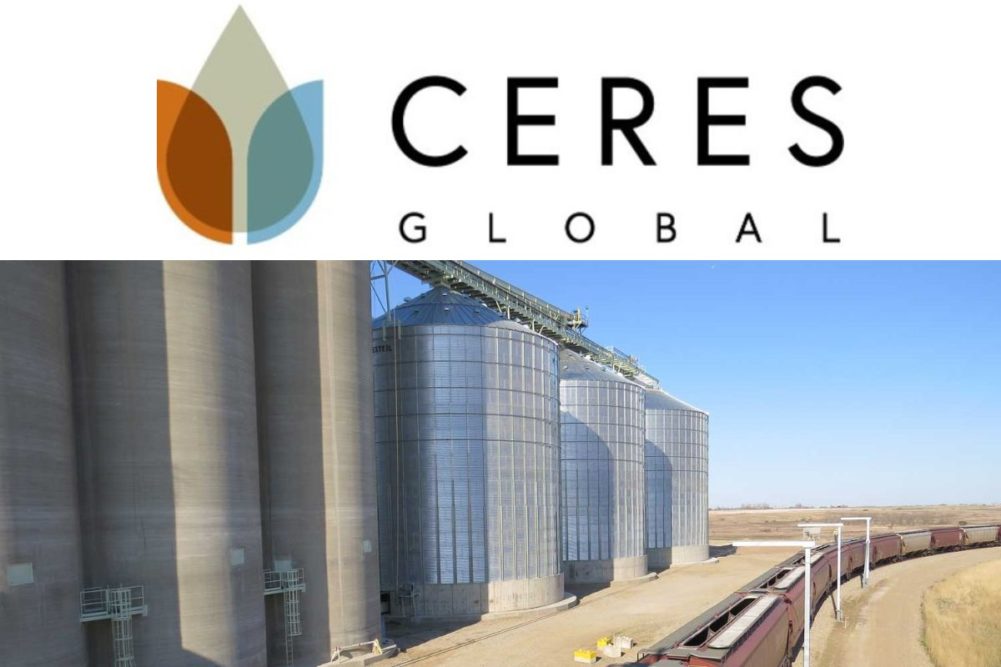MINNEAPOLIS, MINNESOTA, US — Lower ending inventories across the industry and less volume merchandized and traded led to lower fourth-quarter and full-year earnings at Ceres Global Ag Corp.
In the fourth quarter ended June 30, Ceres suffered a loss of $22.54 million, which compared with income of $11.73 million, equal to 38¢ per share on the common stock, in the same period a year ago. Net revenue totaled $278.15 million, up 41% from $196.93 million.
In the year ended June 30, Ceres sustained a loss of $23.97 million, which compared with net income of $8.87 million, equal to 39¢ per share, in the same period a year ago. Adjusted net income, meanwhile, totaled $21.82 million, up from $12.38 million a year ago. Net revenue totaled $1.06 billion, up 42% from $748.2 million in fiscal 2021.
Both the fourth-quarter and full-year earnings results were adversely affected by a $25.9 million loss in the write-off of capital expenditures related to the suspension of the company’s crush plant project at Northgate, Saskatchewan, Canada.
“In our grain segment, we were tasked in navigating a highly volatile market,” Carlos Esteban Paz, president and chief executive officer, said during a Sept. 9 conference call with analysts. “This past year was driven by wide fluctuations in futures and cash markets with the background of an unprecedented drought, record prices and geopolitical uncertainty in Europe. Meanwhile, high prices, Russian demand and customers consume as little as possible through the end of the 2021, ‘22 crop year in anticipation of lower priced new crop bushels. This market dynamic resulted in low volumes merchandise during Q4.
“Regardless of the headwinds, our team anticipated the price changes and maximized opportunities throughout the year while making sure we service our customers across all grain products.
Paz said Ceres’ seed and processing segment realized strong revenues in the fourth quarter due to the seasonality of the business.
“Corn sales were consistent with last year, while soybean volumes were lower,” he said. “Our solid processing plant in Jordan, Manitoba, posted record returns after running full year on expanded capacity. Replacement crush margins for the year were adequate.
“Our crush team, however, did a great job in enhancing these margins by timely hedging and positioning the business while servicing an expanded base of local meal and oil customers. As in the grain business, low soybean inventories resulted in crush margin contraction on lower volumes from the Jordan Mills soybean crush plant in Q4.”
He said Ceres handled and traded approximately 95 million bushels of grain and oilseeds in fiscal 2022.
“Despite a smaller crops and lower inventories across the industry, we continue to find needed supply for key customers and consistently delivered high-quality products,” he added.
During the fourth quarter Ceres completed the acquisition of 50% ownership of Berthold Farmers Elevator, LLC. The company also closed on the sale of St Agathe Bird Food facility and suspended its crush plant project at Northgate.
During the conference call, James T. Vanasek, chairman, elaborated on the decision to suspend the canola crush development at Northgate.
“Although the company worked very hard for 13 months to bring the proposed crush plant into fruition, the board made the difficult decision in June to pause the project for the time being,” he said. “One key reason was that the scope of the project changed drastically during that time. As we worked on the engineering and design of the plant, the project's expected costs grew from $350 million, which included power generation to $530 million without power.
Ultimately, the board and management determined it was in the best interest of Ceres and our stakeholders to suspend the equipment contract related to the project to reduce our future liabilities under the agreement. Although we suffered a temporary setback, we want to make it clear that Ceres remains committed to developing this project in some form, and we will continue to engage with potential financial, energy and agricultural partners to develop a crush facility at Northgate.
“We believe Northgate is still a prime location for such a plant as ideally located to originate canola seed from our farmer partners and with a direct connection to the Burlington Northern Railway provides the most cost-efficient source of canola oil to the US market.
“Combined with our recent acquisition of a stake in the Berthold co-op, Northgate can originate plenty of locally grown, low-cost US and Canadian canola to feed the crush facility. Moreover, Northgate’s existing infrastructure will significantly reduce the plant startup cost and time in comparison to a new build on a greenfield site.”






